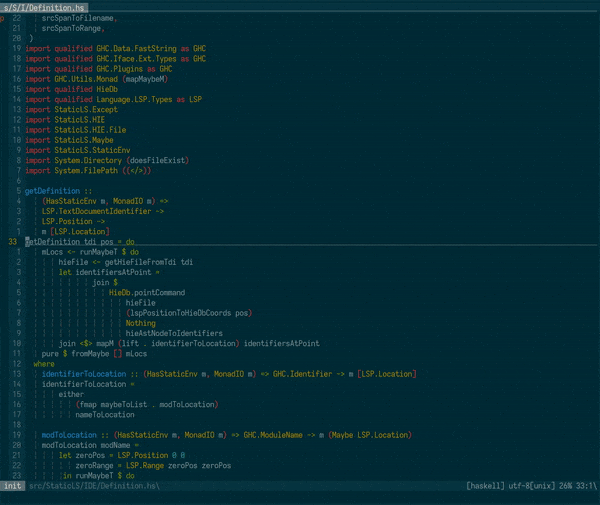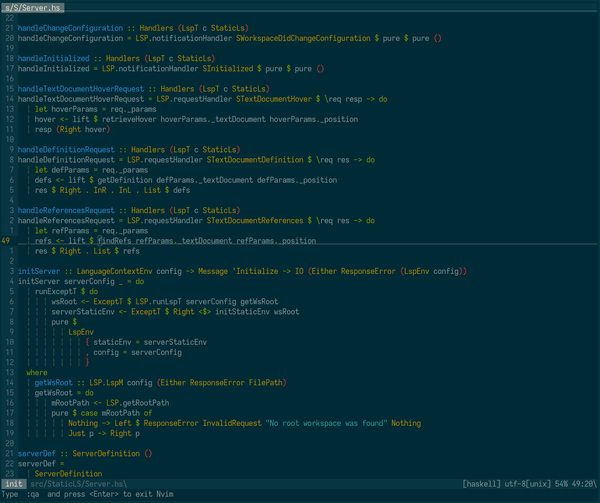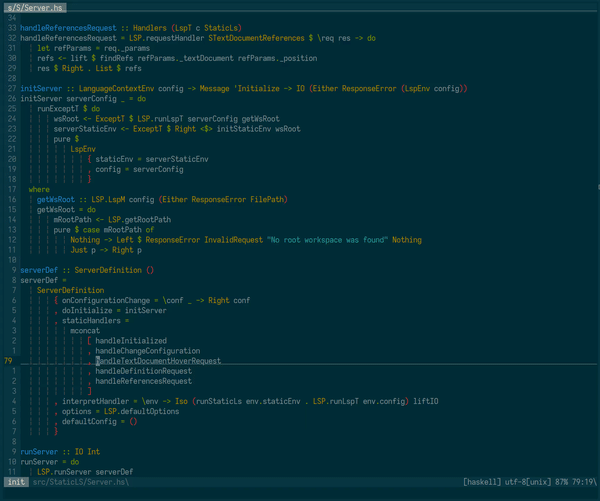static-ls ("static language server") is a hie files and
hiedb based language server heavily
inspired by halfsp, which reads static
project information to provide IDE functionality through the language server
protocol. static-ls will not generate this information on its own and instead
will rely on the user to generate this information via separate programs
Supported static sources of information currently include:
- hiefiles
- hiedb
The goal of static-ls is to provide a high-speed, low-memory solution for large
projects for which
haskell-language-server
tends to take up too much memory on recompilation.
Haskell-language-server
is recommended if you are not experiencing these issues. static-ls is meant
to work on enterprise size projects where aforementioned constraints can be an
issue. static-ls tends to work better standalone as a code navigation tool
since project edits require re-indexing of hie files but also works reasonably
well for editing with a program such as
ghcid to watch files for compilation and
the -fdefer-type-errors flag.
In the future we plan to use more sources of static information such as interface files to fetch documentation or ghcid's output to fetch diagnostics
Currently only ghc 9.4.4 and 9.6.1 are explicitly supported but I'm happy to add support for other versions of ghc if desired
-
Compile your project with ide info
-fwrite-ide-infoand-hiedir .hiefilesFor a better UX, the following flags are strongly recommended.
- -fdefer-type-errors - -Werror=deferred-type-errors - -Werror=deferred-out-of-scope-variables - -fno-defer-typed-holesThese flags will allow hie files to be refreshed even if compilation fails to type check and will ensure that type check failures are still thrown as errors.
- If you're using hpack you can add:
to your
ghc-options: - -fwrite-ide-info - -hiedir .hiefiles - -fdefer-type-errors - -Werror=deferred-type-errors - -Werror=deferred-out-of-scope-variables - -fno-defer-typed-holespackage.yaml. See this project'spackage.yamlorstatic-ls.cabalfor examples - You may instead add the following to your
cabal.project.localfile:ignore-project: False program-options: ghc-options: -fdefer-type-errors -Werror=deferred-type-errors -Werror=deferred-out-of-scope-variables -fno-defer-typed-holes
- If you're using hpack you can add:
-
Index your project in hiedb running:
hiedb -D .hiedb index .hiefiles --src-base-dir .from your workspace root. If you're on an older version of
hiedbwhere the--src-base-dirargument is not available use:hiedb -D .hiedb index .hiefiles -
Point your language client to the
static-lsbinary and begin editing! (See Editor Setup for instructions if you're not sure how)
ghcid is recommended to refresh hie files but compiling with cabal build should work as well
static-ls supports the following lsp methods:
textDocument/references- Note that find references only works on top level definitions and can be slow for functions which are used frequently
textDocument/hover- Provides type information and definition location on hover
textDocument/definition- Works on both local and top level definitions
- Must be compiled on the same version of ghc as the project
- You will need to re-index your hie files once you edit your project
Instructions for editor setup
call :CocConfig and copy the following in:
{
"languageserver": {
"static-ls": {
"command": "static-ls",
"rootPatterns": ["*.cabal", "stack.yaml", "cabal.project", "package.yaml", "hie.yaml"],
"filetypes": ["haskell"]
},
},
}


